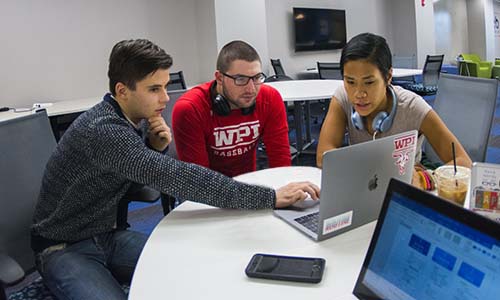At WPI, students pursuing a degree in economics approach the study of economics by using innovative computational tools. We believe students learn by doing, so the program’s strict adherence to rigorous methodological standards for economic experimentation and problem solving will give you valuable and practical skills for addressing real-world challenges.
Our hands-on approach means you’ll be exposed to the full range of theoretical and methodological approaches to economics. You’ll even build computer models simulating economic systems that aid policy analysis.


The WPI Way
If you’re interested in a economics degree at WPI, discover our award-winning faculty, cutting-edge research, and world-changing projects, along with the inspiring accomplishments of our alumni.
Students working toward their degree in economics complete traditional coursework in micro- and macroeconomics, theory, and applied topics, such as development economics, environmental economics, and information economics and policy.
Working closely and in collaboration with expert faculty in WPI’s Experimental Economics Lab students have space and equipment to conduct their own computerized economics experiments that can lead to innovative breakthroughs at the intersection of science and society.
If you’re interested in fields at the interface of economics and technology—such as information or engineering economics—consider a double major in the appropriate technical discipline.
Project-based Learning
Hands-on, project-based learning is the cornerstone of the WPI experience, and a big reason why you’ll stand out to employers. As an economics major, your options might include supporting faculty research, conducting projects off-campus in the U.S. or abroad, and finding your niche.
More Value
Whether it’s real-world work experience through a co-op or internship, accelerating your path with a BS/MS program, or even finding opportunities to integrate coursework with extracurricular interests, personalizing your education at WPI pays off. See how WPI changes your path.
Explore the Career Outlook for Economics
If you’re considering a degree in economics, you’re likely wondering what you can expect after graduation. Check out our career outlook for economics to learn more about average starting salaries, sample job titles, companies who have hired WPI graduates, and more.
Consider a Minor in Economics
Are you interested in learning about how resources are used and distributed throughout the world? Our minor in economics gives you the chance to learn about how events are influenced by economies and resources and how to address them with sustainable solutions.
Apply Your Analytical Skills to Related Degrees
If you’re a savvy problem solver interested in learning more about key areas of business, consider earning a degree in business. You’ll have all you need to base your career on your individual interests while growing as an analytical thinker and decision maker thanks to our flexible course curriculum. More interested in mastering mathematical theory and leveraging that knowledge to solve real problems? Our degree in mathematical sciences could be a perfect fit; you’ll be able to select from a range of math courses, and even have the potential to earn your degree in five years through our BS/MS program. Have a knack for business and technology? Our degree in management information systems combines both fields to give you the skills you need to use computer technology to solve problems. You'll also learn how to forecast sales, analyze trends, and even install hardware.
